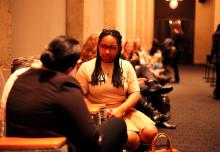What Can I do with a Major in LSJ?
The Law, Societies, and Justice major is ideal for students interested in the practices of institutions meant to create and uphold justice, law, and human and civil rights. LSJ majors graduate with a strong set of skills that can be applied in almost any job or career path. LSJ majors go on to a variety of fulfilling careers in every career field you can imagine. Check out our Alumni Profiles to take a look at what some of our alumni have been up to since graduation.
Your Career Related Skills and Strengths
Employers are usually more interested in your skills and strengths than in your particular college major. As an LSJ major, you have developed many skills that employers view as essential, including:
- Reading and interpreting complex material
- Analyzing information from multiple perspectives
- Producing effective persuasive writing
- Designing and implementing engaging presentations
- Communicating effectively with people from backgrounds different from your own
- Handling ambiguity adeptly
- Using logical reasoning to solve problems
- Conducting research and organizing information
LSJ Career Resources
- Join the LSJ Current Students and Alumni LinkedIn Group to network with alumni and see examples of how alumni have applied their LSJ major in their professional life.
- Attend the annual LSJ Career Night to learn about job search strategies for LSJ majors and network with LSJ alumni. This event is held every Winter or Spring quarter.
- Make the most an Internship experience by conducting informational interviews with co-workers whose work interests you. See the LSJ internship page on this website for more internship information.
- Meet with an LSJ Adviser to discuss your career goals and interests.
Career Resources at the UW
The UW Career & Internships Center in Mary Gates Hall assists with all aspects of your career development, including:
- Discovering what career(s) you’re interested in
- Refining your resume and interviewing skills
- Finding internships
- Finding employment opportunities
- Applying to graduate or professional schools
- Find your interest/identity community, attend a workshop, or meet with a career adviser to get started!
The Community Engagement & Leadership Education Center (CELE) provides leadership and community engagement opportunities for students. Visit the Carlson Center to explore ways to get involved off-campus that enable you to explore careers, learn more about your community, build career skills, and give back.
The UW Office of Merit Scholarships, Fellowships & Awards provides advising for applications to graduate and professional programs, as well as various post-BA fellowship programs including the Fulbright and the Peace Corps.
The College of Arts & Sciences Center for 21st Century Liberal Learning offers a wide variety of professional development opportunities for liberal arts majors, including career preparation courses, mentorship programs, and employer challenge events.
The UW Law/Government/Policy Webpage offers useful information for students considering law school.
LSJ Career Panels
LSJ Career Panels invite LSJ Alumni to share best practices for professional and career development.
Frequently Asked Questions
With a major in LSJ, what job can I get?
Answer: Our program is designed to not only allow students to focus their studies topically, but also to encourage the development of skills that can be applied in almost any job or career path. These skills include: written communication, analytical thinking, logical reasoning, and the capacity to synthesize complex information about social and cultural dynamics. Graduates from LSJ currently work in NGOs (non-governmental organizations), criminal justice, law, policy development, education, and government. Many of our students also choose to continue on to graduate or professional degrees in: political science, sociology, anthropology, geography, international studies, ethnic studies, women studies, social work, public administration, journalism, education, and law.
LSJ is an ideal major for students interested in the practices of institutions meant to create justice, law, human and civil rights, and related social structures. Since LSJ is not a vocational or pre-professional program, it best serves students interested in these topics even if their career goals are not decided.
Students are best advised to choose a major not based on vocational considerations but rather on intellectual passions. Multiple resources exist for students to explore more particular career paths. Students should visit the UW Center for Career Services; volunteer or intern as often as possible; talk with faculty, advisers, graduate students and undergraduates about their plans; attend career fairs; construct resume and job hunting skills; and be active in the community.
Is this the best major for me if I want to work in law enforcement?
Answer: For students interested in pursuing a career in law enforcement, probations, or corrections this major offers a different approach than the more traditional ‘administration of justice’ or ‘criminal justice’ majors. There are a lot of vital skills which can be gained from an LSJ major that are valued in criminal justice careers: analytical and logical thinking, written communication, oral communication, appreciation of different cultures and life experiences, and complex problem solving. Because fields like probations, corrections, and law enforcement are very competitive, it is a good idea to supplement your education with as much interning and volunteer work as you can while you are a student at UW.
Is this the best major for me if I want to go to law school?
Answer: For students interested in continuing on to law school, this major offers a chance to develop some of the most important skills that juris doctor programs want to see: skillful reading, articulate writing, logical reasoning and analysis, and clear oral communication. Because these skills are learned while studying topics related to law, many students find it to be an ideal preparation for applying to law school.
Law schools are less interested in a student’s major than his/her grades and mastery of key skills. Those who wish to attend law school are advised to major in a topic that captivates them intellectually. Passionate interest in subject matter will translate into better skill acquisition and better grades.
